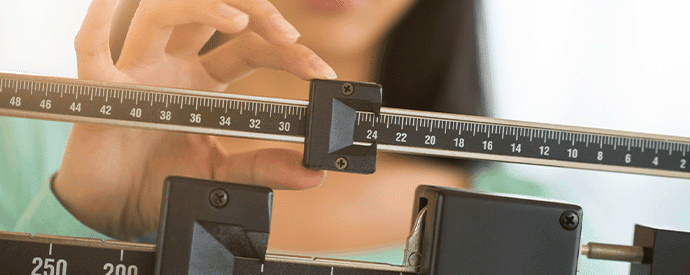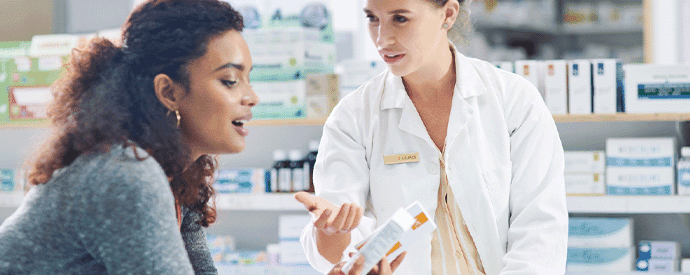To become an egg donor with Fairfax EggBank all applicants must meet our requirements to be accepted into the program. Most of these requirements are expected and familiar: age between 19 and 30, good physical and mental health. But there’s one requirement that causes a lot of confusion amongst potential egg donors: the BMI requirements. We require all egg donors to have a BMI in the range of 18-29.
Requiring a certain BMI may seem biased or even insulting, as if it’s about a donor’s physical appearance. But, when it comes to egg donation it’s about the egg donor’s safety. According to many scientific studies, a BMI that’s too high or too low can correspond with problems that could impact an egg donor’s health as well as the quality and quantity of eggs retrieved.
When we talk about BMI, what do we mean? BMI is simply the calculation of weight-for-height used to classify underweight, overweight, and obese adults. The Centers for Disease Control considers a healthy weight range to be 18.5-24.99. While BMI doesn’t measure fat directly, it’s still the measurement scientists and medical professionals use to assess body fat. There are plenty of online calculators available to help you calculate your BMI, and you can speak to your doctor for a better understanding of a healthy BMI and weight for you.

We’ve talked about what BMI measures—so what does it have to do with your fitness to be an egg donor? What if the donor egg recipient doesn’t have a high BMI? The answer is complicated, but scientific studies show a link between a higher BMI and issues with eggs and how they develop.
All of these factors can have serious consequences for recipients hoping for a successful pregnancy.

Another issue with a higher BMI is that it might mean more medication will be required during the egg donation process. A higher dose and/or a longer dosage of gonadotropins (egg stimulation meds used in egg donations and IVF) could lead to fewer eggs being retrieved. A lower number of eggs can mean less success for patients using IVF treatment with donor eggs.
On the other side, a low BMI can pose risk factors as well. OHSS, or ovarian hyperstimulation syndrome, is a possible side effect from the medications used in egg donation where the ovaries can become swollen and fluid can accumulate in the belly area. Several recent studies found that a lower BMI can increase this risk. As responsible medical professionals, we want to do everything we can to reduce all potential risks to donors.
At Fairfax EggBank, we’re not concerned about our donors’ BMI because of appearance. We’re concerned about egg donor safety and health, including reproductive health. We care about our egg donors, special people who give a precious gift of hope to couples looking to conceive.
_____________________________________________________________________________________
ASRM Practice Committee. (2008). Ovarian Hyperstimulation Syndrome. Fertility and Sterility, 90(3), S188-S193.
Cardozo, E., Karmon, A., Gold, J., Petrozza, J., & Styer, A. (2015). Reproductive outcomes in oocyte donation cycles are associated with donor BMI. Human Reproduction Hum. Reprod. doi:10.1093/humrep/dev298
CDC. (2015). About Adult BMI.
Crujeiras, A. B., & Casanueva, F. F. (2014). Obesity and the reproductive system disorders: Epigenetics as a potential bridge. Human Reproduction Update, 21(2), 249-261. doi:10.1093/humupd/dmu060
Rittenberg, V., Seshadri, S., Sunkara, S. K., Sobaleva, S., Oteng-Ntim, E., & El-Toukhy, T. (2011). Effect of body mass index on IVF treatment outcome: an updated systematic review and meta-analysis.Reproductive Biomedicine Online (Reproductive Healthcare Limited), 23(4), 421-439. doi:10.1016/j.rbmo.2011.06.010
Still have questions about how your BMI might affect your application? The fertility specialists at Fairfax EggBank are here to help! Contact us and we’ll happily answer all of your questions to help start you off on your egg donation journey.
Do I qualify as an egg donor? Click here for egg donor qualifications.
Have any other questions about egg donations? Check out our FAQs, our egg donor blog, or contact us.
Register to gain full access into our comprehensive donor profiles, including adulthood photos (upon submitting a photo consent form), family medical history, and personal essays. You‘ll also be able to "favorite" donors you like, print donor profiles, and more!
REGISTERRegister to gain full access into our comprehensive donor profiles, including adulthood photos (upon submitting a photo consent form), family medical history, and personal essays. You‘ll also be able to “favorite” donors you like, print donor profiles, and more!
Already have an account? Login here.